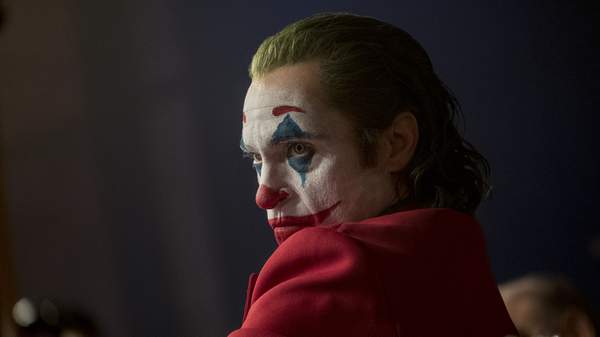Overview
UPDATE, January 29, 2021: Joker is available to stream via Amazon Prime Video, Foxtel Now, Google Play, YouTube and iTunes.
Lonely, isolated and struggling with a lifetime of trauma, a man exorcises his demons through violence. Plagued by troubling memories and mental health issues, but devoted to caring for his ailing mother, he finds catharsis in wreaking havoc on others. When Joaquin Phoenix played this part to perfection in Lynne Ramsay's You Were Never Really Here, he explored the burdens of a crusading hitman who rescued violated children — saving them from the pain he still suffered, and punishing the abusers who treat kids as carelessly as he once was himself. And while he steps into similar shoes in Joker, the exceptional actor is now on a completely different mission, crossing the threshold from noble vigilante to deranged villain.
It's impossible to watch Joker without thinking about You Were Never Really Here; by casting Phoenix as Arthur Fleck, the man who becomes one of Batman's worst enemies, that's an intended effect. It's impossible to see director Todd Phillips' (The Hangover) take on Gotham's clown prince of crime without thinking of Martin Scorsese's Taxi Driver and The King of Comedy as well. Phillips cakes his influences on thick and, if the connection wasn't already apparent in the film's 70s look and feel, he also enlists Robert De Niro as Arthur's favourite television host. It's a purposeful move, filtering one of popular culture's most infamous antagonists through such blatant touchstones — and, it ensures that viewers won't be contemplating the character's past guises, be it Cesar Romero's TV version, Jack Nicholson's unhinged late-80s spin, Heath Ledger's Oscar-winning portrayal or Jared Leto's cartoonish work in Suicide Squad.
Focusing audiences firmly on the Joker at hand, this origin story asks a probing question: if the world's ills were to shove a tormented man over the edge in a volatile socio-political climate, what would that look like? In other words, how would You Were Never Really Here play out if its assassin killed to avenge a cruel, uncaring city's failings, rather than protect its victims? Or, what shape would Taxi Driver take if its cabbie was a bullied clown-for-hire? Phillips stops short of lifting the latter movie's dialogue, but it's easy to imagine Arthur uttering one of Taxi Driver's well-known lines: "here is a man who would not take it anymore".
First seen grinning into a mirror as he puts on his makeup (and signalling the film's allegiance with his fraying mindset in the process), Arthur doesn't have much to smile about. He's beaten by street punks on the job, loses his mental health care due to citywide budget cuts and watches his mother (Frances Conroy) fruitlessly try to contact her ex-employer turned mayoral candidate, aka billionaire Thomas Wayne (Brett Cullen). An aspiring comedian, Arthur is also taunted and jeered whenever he steps onstage. Basically, his life is one huge kick in the face after another. But his mum has always told him that he was put on this earth to spread joy and happiness, which he takes to heart. As Gotham descends into riots and widespread violence, Arthur finds a drastic way to put this belief into action.
When Joker isn't shoehorning in undoubtedly necessary but still distracting Batman references (including yet another re-do of a scene that's been done to death), it just keeps inspiring questions. Is Arthur an inevitable product of a crumbling city that's failed its citizens in general, and its most vulnerable in particular? Or, clinging to his downtrodden status, does he capitalise upon his powder-keg surroundings, using it to excuse his psychopathic behaviour and demand that he's finally paid the attention he's certain he deserves? Penning a deliberately thorny narrative, Phillips and co-writer Scott Silver (The Fighter) keep both of these perspectives in their sights. Alas, the pair sometime struggle to juggle the opposing notions, or to flesh them out beyond the obvious. Indeed, for all the controversy that Joker has sparked since it nabbed the top prize at this year's Venice Film Festival, it's mostly happy to stick to the murky middle ground. The movie paints a thoroughly nightmarish image of modern-day capitalism and its devastating imprint on the 99 percent — one that instantly rings true — but remains content to dance along its surface rather than burrow meaningfully into its dark heart. Specifically, it calls out the conditions that lead to the Joker's rise, yet never quite decides if it's condemning, celebrating or commiserating with him.
Joker is unflinchingly bold and brilliant in one inescapable fashion, though, as it was bound to be when it cast its lead. All skin, bone and sinew as he cavorts, frolics and chortles, Phoenix is in stunning, mesmerising, awards-worthy form yet again. His raspy cackle isn't easily forgotten; neither is his off-kilter demeanour, whether Arthur is connecting with his neighbour (Zazie Beetz), taking a stand against the latest folks to push his buttons or leaning as far into his crazed impulses as possible. When, towards the end of the film, Lawrence Sher's (Godzilla: King of the Monsters) textured cinematography peers up at Phoenix as he struts down some stairs, its hypnotised gaze doesn't feel out of place. In fact, it feels natural. That said, that the scene is accompanied by 'Rock and Roll, Part 2' by convicted sex offender Gary Glitter says much about a movie that's often as thematically muddled as it is emotionally and visually striking.
Features
Information
When
Thursday, October 3, 2019 - Wednesday, November 6, 2019
Thursday, October 3 - Wednesday, November 6, 2019
Where
Various cinemas in BrisbanePrice
$15–25-
Event Type
